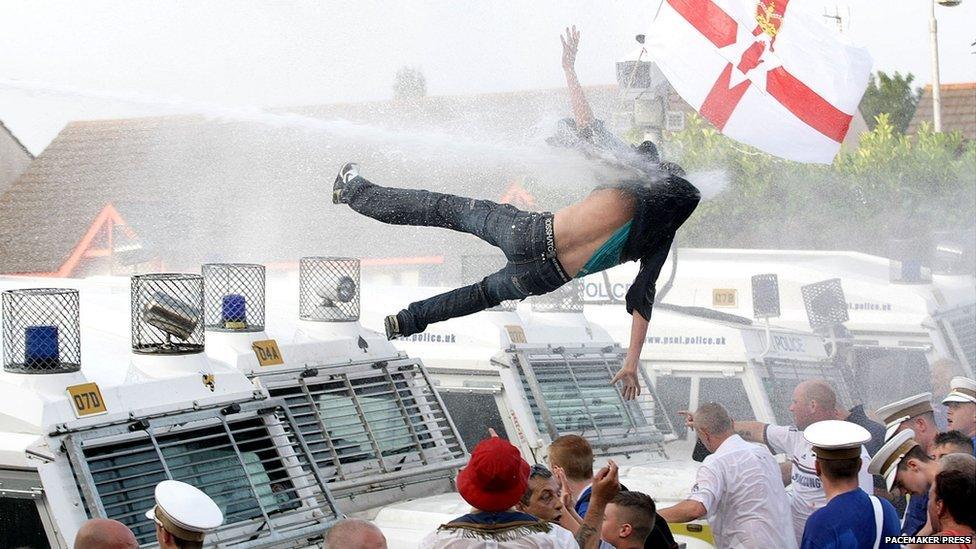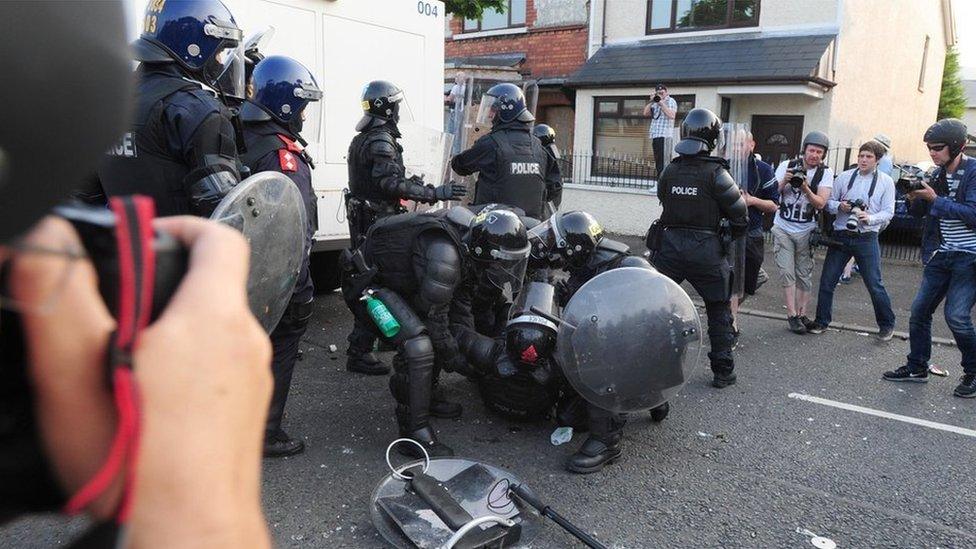Belfast trouble: Woman loses claim against PSNI over baton round
- Published

Claire McCleave told the BBC she had been struck during disorder in Belfast in July 2013
A woman who alleged she was hit by a police baton round during rioting in north Belfast has lost a High Court battle for compensation.
Claire McCleave, 41, sued the PSNI chief constable over injuries she said she had sustained amid serious disorder on 12 July, 2013.
Trouble broke out after an Orange Order parade was stopped on the Woodvale Road.
A judge rejected a claim for damages of £20,000.
This was after finding, on the balance of probabilities, that Ms McCleave was not struck by any projectile fired by PSNI officers.
Mr Justice Simpson also ruled that police used reasonable force at the scene.
He said he was "satisfied that police officers were in regular and imminent danger of serious injury, or worse, from objects thrown by or brandished by rioters in the course of a sustained and lengthy attack".
Water cannon
Trouble flared after the 12 July parade was prohibited from passing the nearby Ardoyne shop fronts.
It followed a determination made by the Parades Commission in Northern Ireland.

Water cannons were deployed by police in an attempt to break up crowds
With crowds of up to 5,000 people at the scene, police came under attack from stones, bottles, cans and pieces of masonry.
Video footage played in court showed some rioters climbing onto and damaging PSNI vehicles.
One man wielded a sword and thrust it at an officer carrying a riot shield amid efforts to breach the police lines.
In attempts to disperse the crowd, water cannon were deployed and a number of baton rounds discharged.
Ms McCleave could be seen at one point in the footage, but there is no suggestion that she participated in the disorder.
Dressed in a union flag bowler hat and carrying a flag, she had gone to the Woodvale Road with her uncle to meet other family members.
In evidence, Ms McCleave stated that she was struck on the chest by something, looked down and picked up an object which her uncle informed her was a plastic baton round.
A short time later she gave an interview to a television news crew and left the scene.
Ms McCleave told the court she was in shock, experiencing chest tightness, pins and needles in her arm and was unable to sleep that night.
The following day she attended hospital, but left without a medical examination.
For a six-month period after the incident she did not want to leave the house, according to her account, and suffered nightmares for another year.
'Not that bad'
In a complaint to the Police Ombudsman, Ms McCleave stated that the rioting had occurred about a quarter of a mile from where she had been standing and "was not that bad".
During cross-examination, however, she accepted the distance in her statement was incorrect, and acknowledged the disorder was worse than she had thought.
Her action alleged negligence, assault, battery, trespass to the person and breach of statutory duty by the police.
Lawyers for the chief constable defended the claim on the grounds that the use of baton rounds was justified.
Water cannon had failed to disperse the crowd or halt the rioting, police lines were under sustained attack, and officers feared serious physical injury, the court heard.

Several police officers were injured in the violence at Woodvale
In his ruling, Mr Justice Simpson set the level of potential damages in the case at £20,000.
However, he dismissed the claim after referring to the medical evidence and Ms McCleave's interview with a BBC reporter.
"I am not satisfied, having seen her demeanour, that she was shaking or appeared particularly shocked in what was the immediate aftermath of the alleged incident," the judge said.
He told the court that it was more likely "the plaintiff picked up a spent round, but that it did not strike her first".